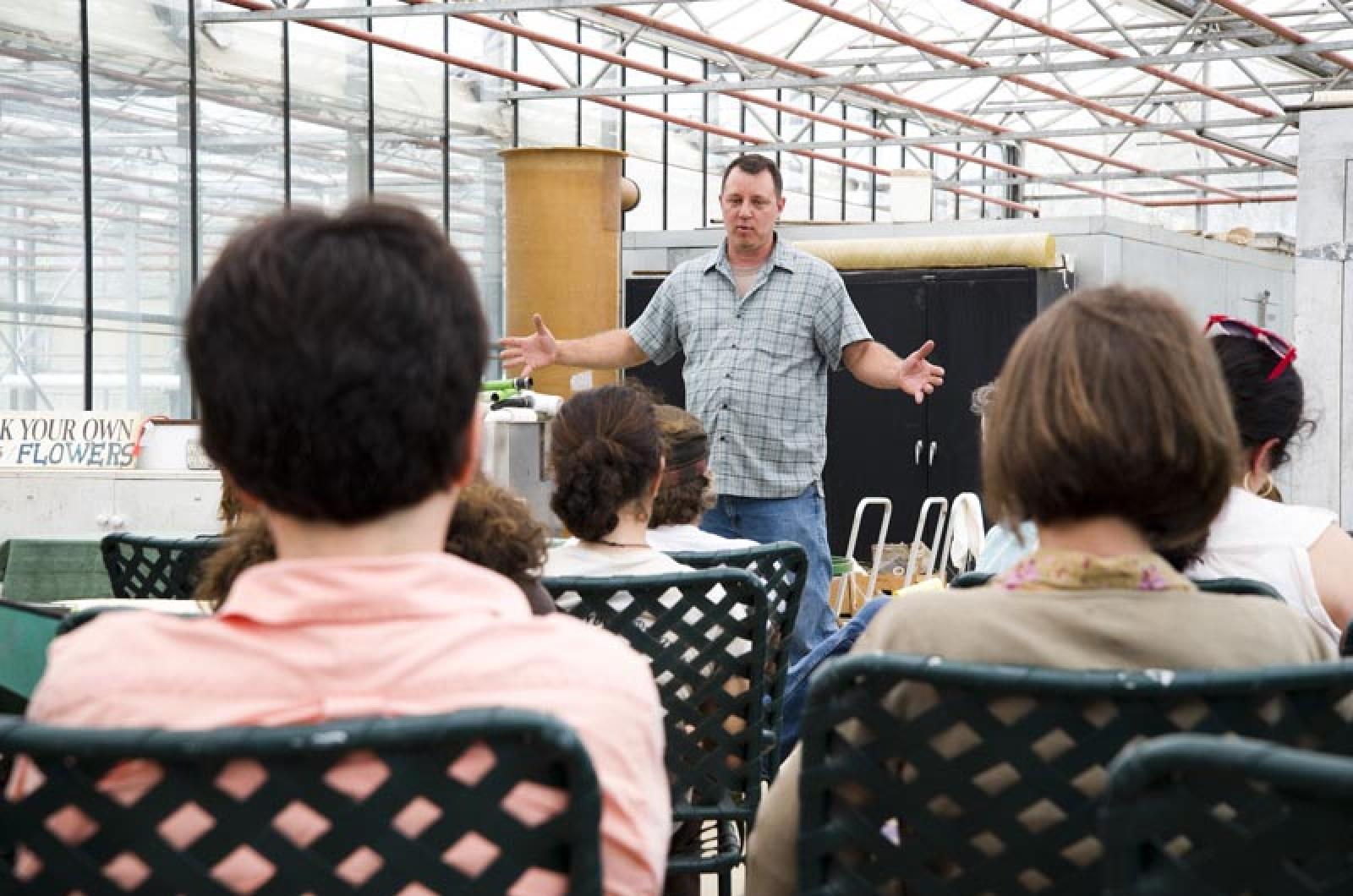His passion is soil, but his career has been inside greenhouses.
Now, as the new manager of the former Thimble Farm property in Oak Bluffs, Keith Wilda will get to do both.
“I have the best of both worlds,” he said in a brief interview following a tour for Island farmers of the property owned by Island Grown Initiative.
Mr. Wilda moved to the Island full time two weeks ago with his wife and twin two-year old daughters to run Island Grown Farms.
Over the past 20 years Mr. Wilda has designed and built recirculating aquaculture systems and integrated aquaculture with hydroponics (aquaponics) to connect fish, food and water in one system.
“Controlled environment agriculture is the biggest growing area of agricultural in the country,” Mr. Wilda said, speaking from the large greenhouse at the farm. “This greenhouse can produce the equivalent of 10 acres of crops in the field and it only takes up one acre . . . we’re going to try opening people’s eyes to that.”
Planning is still in the early stages for turning the 40-acre farm in the center of the Island into a food-producing educational center, and Mr. Wilda said he is going one step at a time.
“We need to move the furniture around the map and see how everything lays out and fits on the building lot,” he said. “I see Island Grown Farms in the community really as a support and educational tool, not as a major producer.”
Mr. Wilda has worked as general manger for two of the largest aquaculture and aquaponic facilities in the country and consulted on small and large farms. And he said this farm immediately felt like home.
“I remember walking into the greenhouse the first time thinking — this is the project,” he said.
He grew up in Hadley; both his parents and grandparents were farmers.
“I started at the age of six picking cucumbers along with my 27 other cousins,” he said. “That’s how my grandmother watched us. I’ve been in agriculture ever since.”
His father specialized in growing ornamental corn, which was so successful Harris Seeds named a seed after him called Wilda’s Pride. Morning Glory Farm in Edgartown grows it every year.
Mr. Wilda’s background in aquaponics and hydroponics came from experience, not a classroom.
“I didn’t go to school for fisheries,” he said. “I’ve taught more aquaculture courses than I’ve actually taken. I’ve never taken any.”
While attending Stockbridge College at the University of Massachusetts at Amherst to study farm management, he took a job at Bioshelters, the first aquaponics facility in the country. He wound up obtaining a degree in resource economics, and after college stayed on at Bioshelters for six years, eventually becoming the general manager.
He later worked at Cabbage Hill Farm, a working and educational farm in Mt. Kisco, N.Y., at a trout hatchery in western Massachusetts and as director of the Westin Center for Sustainable Aquaculture at the University of Massachusetts. Most recently, he worked as general manager at Australis Aquaculture in western Massachusetts.
“We filtered in the building about 72 million gallons a day,” Mr. Wilda said. “That’s the equivalent to the Boston wastewater plant, but we were producing fish you could eat.”
He had started his own consulting business when he heard about the IGI job through a Vineyard friend. He was no stranger to the Vineyard — as part of a consulting job in 1996 he had set up a hydroponic greenhouse at the regional high school. The system is still running, though on a larger scale today, he said. He planned to stop by the high school this week.
He said three things are key for a successful greenhouse project: environmental, community and economic sustainability.
“To get all three to line up sometimes is difficult,” he said. “To make this greenhouse work economically for a grower is a no brainer. For the community and as a grower makes it a little more difficult. The two critical pieces are getting the community and the commercial part of it together.”
He said the greenhouse will not be “a gold plated showroom,” but rather a training ground for students of agriculture. He hopes to work with Island farmers and help them do feasibility studies of their own growing operations.
And he hopes Island Grown Farms will serve as a model.
“It’s a great place to demonstrate it and prove it and make it work,” he said.







Comments
Comment policy »